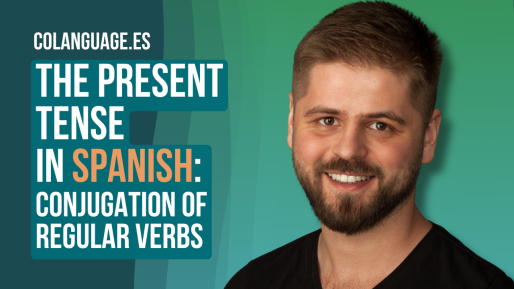Future tense: conjugation of regular verbs in Spanish Share Copied!
Spanish
In this lesson you learn the difference between the two future tenses in Spanish. We have also individual lessons available on each tense.
Video
Podcast
What is the future tense?
The future tense expresses actions that will happen in the future.
- Visitaré a mis abuelos el próximo fin de semana. (I will visit my grandparents next weekend.)
- Vamos a ir de paseo esta tarde. (We are going for a walk this afternoon.)
Future tense of regular verbs in Spanish
We will learn how to conjugate regular verbs in Spanish.
Verbs ending in "-ar": conjugation of "hablar"
In Spanish, many verbs end in "-ar". For the ending in the future tense, the verb "hablar" (to speak) is conjugated here.
| Personal pronoun | Spanish | English |
|---|---|---|
| Yo (I) | Yo hablaré con ella mañana. | I will speak with her tomorrow. |
| Tú (You) | Tú hablarás en la conferencia. | You will speak at the conference. |
| Él/Ella (He/She/It) | Ella hablará en la reunión. | She will speak at the meeting. |
| Nosotros/-as (We) | Nosotros hablaremos sobre el proyecto. | We will speak about the project. |
| Vosotros/-as (You) | Vosotras hablaréis en la clase. | You will speak in the class. |
| Ellos/-as (They) | Ellos hablarán en la entrevista. | They will speak at the interview. |
Verbs ending in "-er": conjugation of "comer"
Another type are the verbs that end in "-er" in Spanish, such as "comer" (to eat).
| Personal pronoun | Spanish | English |
|---|---|---|
| Yo (I) | Yo comeré una ensalada. | I will eat a salad. |
| Tú (You) | Tú comerás con nosotros. | You will eat with us. |
| Él/Ella (He/She/It) | Él comerá en el restaurante. | He will eat at the restaurant. |
| Nosotros/-as (We) | Nosotros comeremos pizza. | We will eat pizza. |
| Vosotros/-as (You) | Vosotros comeréis postre. | You will eat dessert. |
| Ellos/-as (They) | Ellas comerán en la cafetería. | They will eat in the cafeteria. |
Verbs ending in "-ir": conjugation of "vivir"
Finally, there are also the "-ir" verbs, which include for example "vivir" (to live).
| Personal pronoun | Spanish | English |
|---|---|---|
| Yo (I) | Viviré en la ciudad. | I will live in the city. |
| Tú (You) | Tú vivirás cerca del parque. | You will live near the park. |
| Él/Ella (He/She/It) | Ella vivirá en el campo. | She will live in the countryside. |
| Nosotros/-as (We) | Viviremos juntos. | We will live together. |
| Vosotros/-as (You) | Vosotras viviréis en la costa. | You will live on the coast. |
| Ellos/-as (They) | Ellos vivirán en otro país. | They will live in another country. |
While regular verbs in the future tense of have their own stem, the stem of irregular verbs changes.
Future tense: "ir" + infinitive in Spanish
The second way of forming a future tense in Spanish is similar as in English.
| Personal pronoun | Spanish | English |
|---|---|---|
| Yo (I) | Voy a estudiar. | I am going to study. |
| Tú (You) | Vas a viajar. | You are going to travel. |
| Él/Ella (He/She/It) | Va a comer. | She is going to eat. |
| Nosotros/-as (We) | Vamos a leer. | We are going to read. |
| Vosotros/-as (You) | Váis a salir. | You are going out. |
| Ellos/-as (They) | Van a bailar. | They are going to dance. |
Another form to express the future is by using the present tense of the verb "ir" (to go) followed the preposition "a" (to) and an infinitive form.
Key takeaways
Here is a quick summary of this lesson.
- The future tense expresses actions that will happen in the future.
- While regular verbs in the future tense of have their own stem, the stem of irregular verbs changes.
- Another form to express the future is by using the present tense of the verb "ir" (to go) followed the preposition "a" (to) and an infinitive form.
Subscribe to our social media channels to get free daily exercises!



